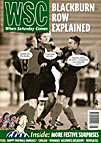 Hull City had a narrow escape from bankruptcy last month and they're not out of the woods yet , as Andy Medcalf explains
Hull City had a narrow escape from bankruptcy last month and they're not out of the woods yet , as Andy Medcalf explains
“At least there will be one Hull team playing Wigan next year,” were the cheeky words of consolation from a similarly downtrodden Hull FC rugby fan following the Tigers recent crash-landing at the foot of Division Two. Barring a Spanish-inspired promocion, it looks increasingly as though this will be the case, if the club still exists in 1996-97.
Hull City are in big trouble, on and off the pitch. Goalscoring (or lack of it) is the source of their dismal League placing, whilst their financial problems are once again dominating both the front and back pages of East Yorkshire newspapers, last month’s £252,000 winding-up order from the Taxman threatening the club’s existence.
Most Tiger fans look to the board of directors (a difficult task, as they seem to no longer attend matches) for solutions to the current difficulties, although, for the first time in living memory, a minority of supporters are even muttering that perhaps it is after all about time the club just gave up and packed it in.
But it needn’t be this way. Hull City have one director reportedly worth £28m, but who is unwilling to inject anything into the club’s coffers, instead putting his 51 per cent share of the club up for sale. That there have been no takers yet is not surprising considering the lucky purchaser will also inherit a £700,000 debt. The other director (yes, there are only two) remains strangely silent – and rightly so after pledging to double any money the supporters raised during their admirable ‘Put A Tiger In Your Team’ appeal, then promptly declaring he wasn’t going to honour it, once the £50,000 target was getting close to being met. They have long memories in Hull, y'know.
Just how does a professional club get into the shambles that the mighty Tigers now find themselves in? For the answer you need to look back to the start of the decade, when the board backed then manager Stan Ternent with an open chequebook. When Terry Dolan took over as boss in 1991, the club were well over £1 million in the red.
After his predecessor stepped down due to ill health, current City chairman, the aptly named Martin Fish, set about reducing the debt. The staff wage bill was slashed, and any player demanding further signing-on fees promptly shown the door (examples being ambitious club captain David Norton, who left for Northampton, and Russ Wilcox, who went to trophy hunt with Doncaster). It was all a messy business, best exemplified by the sacking of crowd favourite and long-term injury victim, Wayne Jacobs, on Christmas Eve. Bah, humbug, Mr Fish.
On the field, Terry Dolan was working miracles. Fielding the Football League’s first-ever team of free transfers and YTS players, the Tigers just failed to reach the play-offs in the last two seasons. Tel must be wondering what a cheque book is, having bought no-one since Northern Ireland international goalkeeper Alan Fettis from Ards in 1991. (On the final day of 1994-95, Fettis had to play up front in an injury-hit side also including three teenage debutants.)
Thankfully, the recent winding-up order was staved off when an unnamed local firm loaned the club the money needed to pay off their tax bill, but with a reported £3,000 being lost each week, it’s not going to be easy to repay, especially considering crowds at Boothferry Park are at an all-time low. In other towns and cities much smaller than Kingston-Upon-Hull, local businessmen appear to be falling over themselves to sponsor their hometown club, but not so here, where sport is seen second only to throwing your cash in the muddy Humber in the Waste-Of-Money stakes.
Fettis, who has just gone on loan to West Brom, and local icon Dean Windass are the players most likely to fetch reasonable fees, but the whole squad has been up for sale for two months now without a single reported offer. Unless I or one of the other 3,000 Hull City diehards win, the National Lottery, the Tigers’ future looks bleak. It’s sad, but soon the largest city never to have hosted top-class football could be without a football club, the club, in fact, who were the first to call in the Official Receivers (back in 1982), but who also have their own (admittedly decrepit) railway station and play in a ground with six free-standing floodlights. Where would matchday programme editors go for their clichés without us?
From WSC 107 January 1996. What was happening this month